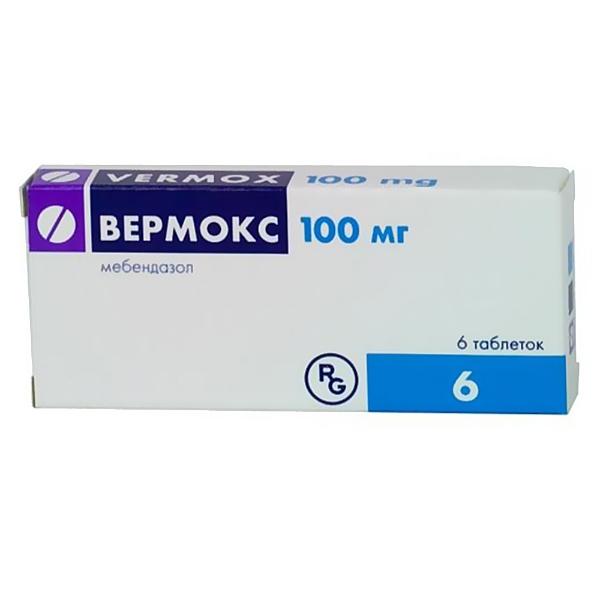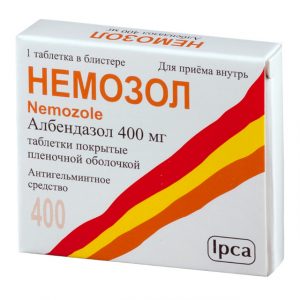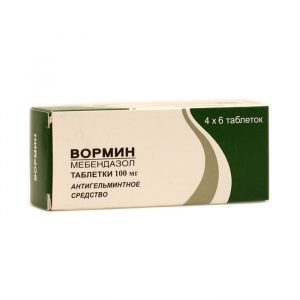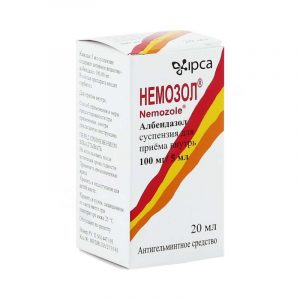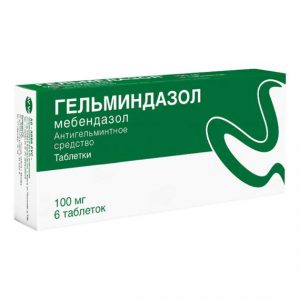Description
release form
tablets
Packing
6 pcs
Pharmacological action
Vermoxum is a broad-spectrum anthelmintic drug most effective in enterobiasis and trichocephalosis.
Causing an irreversible violation of glucose utilization, depletes glycogen stores in helminth tissues, interferes with the synthesis of cell tubulin, and inhibits the synthesis of adenosine triphosphate (ATP).
Pharmacokinetics
Virtually not absorbed in the intestines. T1 / 22.5-5.5 hours. Communication with plasma proteins – 90%.
Unevenly distributed over organs, accumulates in adipose tissue, liver, helminth larvae. In the liver, it is metabolized to a 2-amino derivative. More than 90% of the dose is excreted with feces unchanged. The absorbed part (5-10%) is excreted by the kidneys.
Indications
enterobiosis
ascariasis
hookworm
strongyloidosis
trichocephaliasis
trichinosis
teniosis
echinococcosis crdcrismosrd
Contraindications
ulcerative colitis
Crohn’s disease
liver failure
childhood (up to 2 years)
pregnancy and lactation
hypersensitivity to any component of the drug.
Use during pregnancy and lactation
The drug is contraindicated during pregnancy and during breastfeeding.
Composition of
1 tablet contains:
Active ingredient:
mebendazole 100 mg srldkl 5 mg
magnesium stearate – 3 mg
sodium saccharin – 5 mg
talc – 9 mg
corn starch – 71 mg
lactose monohydrate – 110 mg.
Dosage and administration
Inside, with a small amount of water.
Adults and children over 3 years of age: with enterobiosis – 100 mg once a day and mixed helminthiases – 100 mg in the morning and evening for 3 days. If the symptoms of the disease persist, it is recommended to repeat the treatment after 3 weeks.
Adults and children over 14 years of age: with echinococcosis in the first 3 days – 500 mg 2 times a day, in the next 3 days the dose is increased to 500 mg 3 times a day, then the dose is increased to 1000-1500 mg 3 times a day. The average duration of treatment for echinococcosis caused by Echinococcus granulosus is 4-6 weeks caused by Echinococcus multilocularis – up to two years. When trichenellosis on the 1st day – 200-300 mg 3 times a day, on the 2nd day – 200-300 mg 4 times a day, and from the 3rd to the 14th day – 500 mg 3 times in a day.
It is recommended that all family members be treated concurrently. With ascariasis, trichocephalosis, hookworm, teniosis, strongyloidosis and mixed helminthiases, in the morning and evening, 100 mg for 3 days.
Side effects
Dizziness, nausea, abdominal pain.
When used in high doses for a long time: vomiting, diarrhea, headache, allergic reactions (skin rash, urticaria, angioedema), increased activity of hepatic transaminases, hypercreatininemia, leukopenia, anemia, eosinophilia, hair loss, hematuria, cylinder.
Drug Interactions
Reduces the need for insulin in patients with diabetes.
Co-administration with lipophilic substances should be avoided.
Cimetidine can increase the concentration in the blood, carbamazepine and other metabolic inducers – lower the concentration of Vermox in the blood.
Overdose
Symptoms: abdominal pain, nausea, vomiting, diarrhea. When used in high doses for a long time: reversible impaired liver function, hepatitis, neutropenia.
Treatment: it is necessary to remove the drug from the stomach by causing vomiting or by washing the stomach, receiving activated charcoal.
Storage Conditions
At 15 30 ° C.
Terms and conditions
prescription
dosage form
tablets
Possible product names
VERMOKS 0.1 N6 TABLE
Vermox 0.1g Tab. X6 (R)
Vermox 100mg No. 6 tab
VERMOKS 100MG. No. 6 TAB. / GEDEON RICHTER /
Vermox tablet 100mg N6
Gedeon Richter Vengriya
